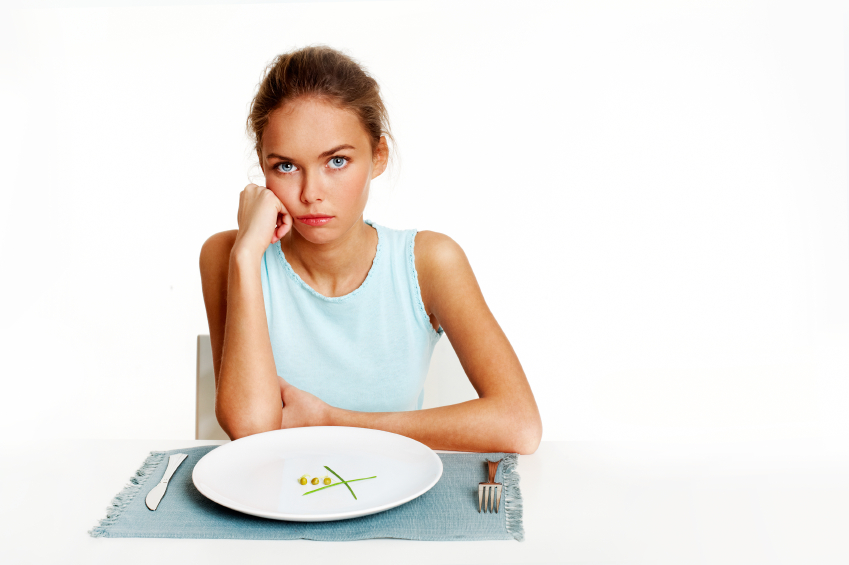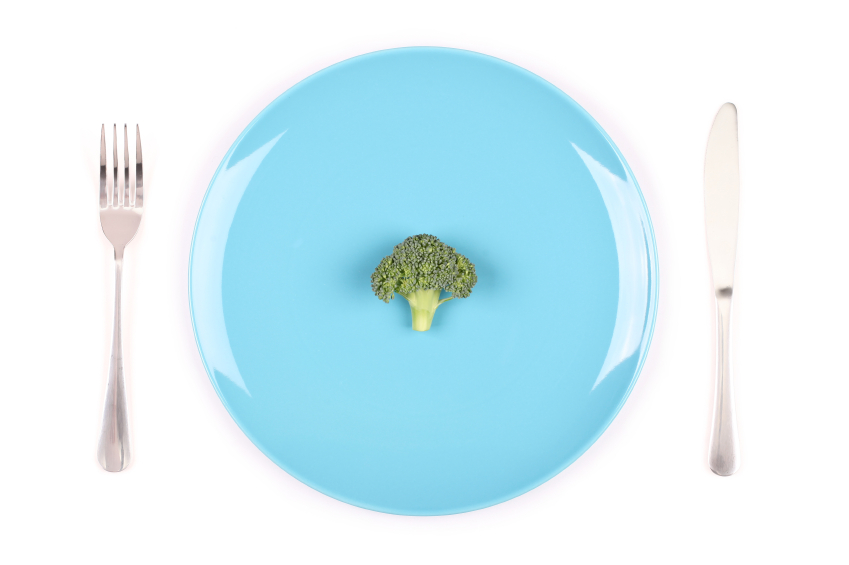Fasting diets might lead to weight loss but how healthy are they really? When Anna Magee tried it the resulting food obsession wasn’t pretty. She investigates the fasting backlash
Diets are like hemlines. One minute they’re generous, the next they’re stingy. Not long ago we were being told to eat five small meals a day, which for most of us amounts to piles of food. Now, the de rigeur plans of the moment advocate dramatically cutting down on calories. Enter the phenomena of the fasting diet, aka starving yourself on certain days of the week to lose weight. The most popular of the fasting diets is The Fast Diet: The Secret of Intermittent Fasting – Lose Weight, Stay Healthy, Live Longer, by Dr Michael Mosely and Mimi Spencer, which we wrote about last issue in Red, where you cut down to 500 calories, two non-consecutive days a week.
But when I tried it, it was torturous. I don’t technically need to lose weight but but I do have high cholesterol. So, having seen the research about the health effects – more on that in a moment – including lowered cholesterol but also longer life and lowered cancer risk I couldn’t resist.
The first night of a day on 500 calories, the vacuum in my tummy sucked hard at my attention and I had to get up at midnight and stand at the fridge eating yoghurt with raisins to fill it. Undignified.
Sleep problems are cited as a common side effect of fasting and I tried again the next week only to actually dream of a chocolate brownie. Moreover, I was so lethargic the next day in the gym that I only managed a walk on the treadmill, let alone the power sprints and heavy weights I can do when I am allowed dinner the night before.
So I ask you, what’s the point of losing weight if a degree of your physical power is gone along with it? All this ‘strong not skinny’ and ‘fit not thin’ doing the rounds on social networks is a great thing but how can we be fit and strong when we’re starving ourselves – literally – for a third of our lives. Most alarmingly, when I tried fasting I became obsessed with what I could and would eat the next day even scanning M&S at one point for the perfect crème brûlée.
Though fasting has become a buzzword of late, it has had many guises. Perhaps the most studied is calorie restriction (CR), which scientists have been looking at for the last 80 odd years, in which you permanently cut calorie intake to 25-30 per cent of what your body needs. It’s been linked to more benefits than mere weight loss, most notably increased longevity but also prevention of heart disease, cancer and memory decline. More recent fasting diet hybrids include Alternate Day Fasting (ADF) which involves cutting right back on food to around 500 calories on one day and eating freely the next. This too aids weight loss and in fact, a review of the studies on ADF published in the American Journal of Clinical Nutrition also found that it’s effectiveness on lowering risk of heart disease, type-2 diabetes and cancer was comparable to CR, though it concluded more research was necessary to prove the effects were long-term.
The biggest tidal wave of excitement has been about The Fast Diet, also known as the 5:2 diet where you cut calories to 500 for women and 600 for men for two non-consecutive days a week and eat normally for the rest. Touted as the thinking person’s science-backed choice, the book presents studies showing periodic fasting aids quick weight loss and may help prolong life, cut the risk of cancer, type-2 diabetes and heart disease such as those on ADF by Krista Varady, Professor of Kinesiology and Nutrition at the University of Illinois in Chicago.
But hints of dissent are brewing amongst fasting advocates. Of Spencer and Moseley’s book, Professor Varady recently told Healthista: ‘There is no study that has examined the effectiveness of the 5:2 diet. In my opinion, his book completely misrepresented my research, and I am very bothered by this. Since the 5:2 diet only involves fasting two days a week, instead of four days a week (as with ADF), I don’t think the same health benefits would be noted’. Read our interview with Dr Varady here.
Having said that, a study led by Dr Michelle Harvie, and published in the International Journal of Obesity compared those on a 5:2 fasting diet with those on a regular low-calorie diet and not only did those fasting lose weight, they also exhibited reductions in leptin (the hunger hormone), more stable insulin levels, lower cholesterol and blood pressure. But her study lasted only six months.
I know fasting works for some people. A friend told me his colleagues were convinced he was terminally ill because he lost so much weight so quickly while fasting. But after my experience, I wondered are the results as proven as their authors would have us believe, for everyone? And what effect can starving for 30 per cent of the week have on your daily life? If your brain is so glucose-deprived that you can’t concentrate on a conversation, is being skinnier worth it? Recently, a friend warned, ‘Don’t call anyone for work on Mondays or Thursdays. They’re all fasting and too h-angry to listen’.

A quick scan of fasting forums gave clues as to how it’s playing out behind closed doors. ‘I’m in my fourth week of the fasting diet and I find I am becoming more obsessed with food rather than less,’ says ‘horseygal’. ‘On non-fast days I am eating more ‘because I can’ to the point where I am planning baking cakes and puddings that I would not normally do. Also, scoffing more the night before a fast day as I won’t be able to eat it the next day!’ Cue an avalanche of ‘me too’s and ‘So glad it’s not just me’s. Others have recorded their food obsession on Twitter. ‘I was obsessed within five minutes of starting the diet, couldn’t stop thinking about food, just hideous,’ said one. ‘When I am fasting I am obsessed with food. OBSESSED!’ shouted another.
They’re not alone – a recent study on adolescent boys and girls published in Neuroimage found that restricting food intake increased the degree to which the brain saw food as a reward and prompted them to seek higher calorie, higher fat foods when they could eat
‘I am not a fad dieter at all,’ says Rachel Moore*, 35, a charity campaigns manager from Bristol who had about ten pounds to lose. ‘I saw Michael Moseley, himself a doctor there on his Horizons documentary on the BBC trying fasting and thought, it must be a legitimate way of losing weight.
‘On my fast days I would have a poached egg for breakfast and a miso soup in the evening with grilled chicken and vegetables. I managed two and a half weeks and was starving all day, especially in the afternoon. I was ratty with colleagues then at home I’d go to bed at 8pm. My boyfriend tried it too and we were both too tired to even speak let alone have sex. The hunger was so distracting that in the end I couldn’t carry on, I felt useless. I couldn’t exercise because I was exhausted and had to co-ordinate my week around the days when I could eat. In the end I thought: I’m not spending two days a week for the rest of my life miserable.’
There is the possibility of mood changes, feeling tired, irritable, dizzy and light-headed when blood sugar drops during the fasting state, says Marilyn Glenville, a nutritionist and author of some 30 books on eating, food and health. ‘Women are more susceptible, especially during the second half of their menstrual cycle when lower levels of the hormone progesterone can make them more prone to low blood sugar, especially if they are subject to stress and pressure at home or work’.
Dr Moseley talked about beginning his fasting day with two poached eggs and ham, skipping lunch and ending it with steamed fish and vegetables but other 5:2ers report skipping breakfast as their calorie-slashing strategy. ‘I worry about people who fast and skip breakfast,’ says Dr Glenville. ‘This can cause blood sugar to crash and make people feel desperate around food when they next eat which could make it more difficult to not eat, or make healthy choices, later on.’ In fact, at study last year from the University of Missouri found breakfast skippers consume 40 per cent more sweets, 55 per cent more soft drinks and 45 per cent fewer vegetables than people who eat breakfast.
While there is some evidence of fasting benefits in humans, most studies have been done on rodents. ‘Most of the fasting research has been done on animals showing it helps with weight loss, longevity and insulin levels and we don’t know if this translates to humans,’ says Dale Rees, a lecturer in dietetics at London Metropolitan University and spokesperson for the British Dietetic Association. ‘Human studies are on a small number of people and of a short duration. Plus, they’re predominantly done on alternate day fasting and not intermittent fasting,’ Rees explains.
So is fasting just dressed-up calorie cutting then? In Dr Harvie’s trial, both groups lost about six kilograms in six months. ‘This is another way of restricting your energy intake, which is going to help you lose weight,’ says Dr Sally Parsonage, nutritional science lecturer at the University of Westminster. ‘But I would be concerned people who eat only 500 calories a day could lose lean muscle and that their basal metabolic rate may drop so they may put on weight when they stop. Plus, two days a week not really eating anything means nutrient intakes may be sub-optimal leaving you potentially deficient in iron, vitamin C and protein,’ says Dr Parsonage.
‘I was starving the next day after fasting,’ says Debra Somerville*, 32, a graphic designer from Manchester. ‘I would eat crisps and dessert which I wouldn’t normally because I thought, ‘well I only ate 500 calories yesterday.’ She gained four pounds in four weeks on the 5:2 diet. ‘I found myself waking in the middle of the night and eating dippy eggs and having a medium chocolate bar three times a week – which adds up. I was dizzy and couldn’t concentrate at work and found it so tedious talking about and thinking about food I decided to stop. In the last month I stopped eating sugar, am walking to work and having things like chicken stir-fry for dinner and I’ve lost the three pounds again. I won’t fast again, it makes you focus too much on food. It makes you boring.’
There is something boarding school bullish about this fasting thing that appeals to those who – whether they admit it or not – like their diets garnished with self-punishment. ‘People that do well on fasting diets like the idea of ‘the nastier it feels, the better it must be for you’, says Dr Parsonage. ‘You can write them a balanced diet full of nutritional value but they won’t do it because it won’t feel tough enough.’
Although super-chef Hugh Fearnley-Whittingstall, a fasting evangelist described the 5:2 diet as ‘rather exhilarating,’ Raymond Blanc called it ‘ridiculous.’ ‘The British are so messed up about food,’ said Blanc. ‘They have fear and guilt, they binge and purge. Why can’t they just enjoy food?’ Anecdotally, fast dieters talk about the psychological power they get from feeling in control of food sometimes for the first time ever but Rachel Moore worries about the effects of this over time. ‘Starving is psychologically draining,’ she says. ‘The authors of the diet talk about how it’s nice to feel hungry and how you can learn to enjoy the hunger but that could be dangerous.’
Ultimately fasting works for some and not for others, says Dale Rees. ‘Patients of mine who work well on it are those that love routine, planning and set mealtimes. People who prefer to eat ad hoc will find the fasting diet difficult – and I wouldn’t recommend it for the seriously obese or the almost underweight, who might be on the brink of an eating disorder and be triggered by something like this.’
Although the fine print at the beginning of theThe Fast Diet Recipe Book says it’s a no-no for anyone with an eating disorder, it’s easy to see how the diet’s license to strictly control eating some days and not others could lead to disordered eating, if not a full blown eating disorder. ‘Someone with a binge/purge psyche could use the diet to fuel the binge side of disordered eating and may begin to see the non-fasting days as free rein to eat rubbish,’ says nutritionist Zoe Harcombe. ‘Eat what you want for five days and then starve for two,’ says Harcombe. ‘I did that for years when I was a teenager. It was just called bulimia then.’
*names have been changed
Fasting will suit you if…
You sometimes forget to eat and feel fine
You have never had emotional issues with food
You have never had an eating disorder (or disordered eating)
You prefer gentle exercise like yoga and/or walking
You love rules and a challenge
You have lulls at work where you can do process tasks without much mental effort
Fasting won’t suit you if…
You get jittery and dizzy if you don’t eat
You have disordered eating or other eating issues (past or present)
You’re stressed or exhausted
You exercise hard most days or are training for an event
Your job is high pressure and mentally taxing
You’re diabetic, pregnant or have medical issues
Like this article? Sign up to our newsletter to get more articles like this delivered straight to your inbox.






















































